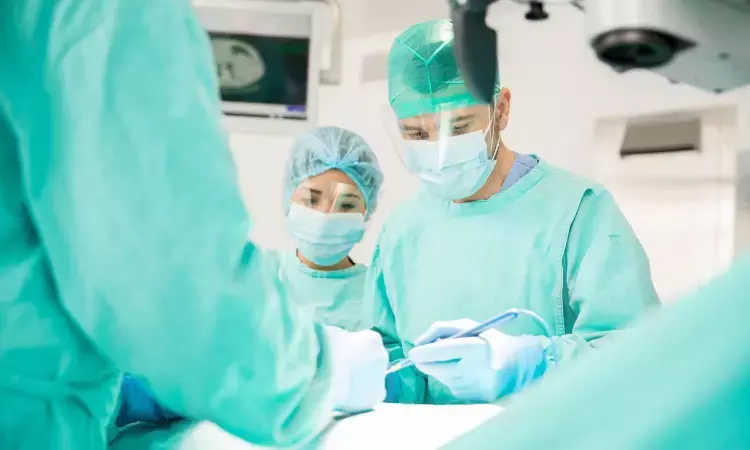- Home
- Medical news & Guidelines
- Anesthesiology
- Cardiology and CTVS
- Critical Care
- Dentistry
- Dermatology
- Diabetes and Endocrinology
- ENT
- Gastroenterology
- Medicine
- Nephrology
- Neurology
- Obstretics-Gynaecology
- Oncology
- Ophthalmology
- Orthopaedics
- Pediatrics-Neonatology
- Psychiatry
- Pulmonology
- Radiology
- Surgery
- Urology
- Laboratory Medicine
- Diet
- Nursing
- Paramedical
- Physiotherapy
- Health news
- Fact Check
- Bone Health Fact Check
- Brain Health Fact Check
- Cancer Related Fact Check
- Child Care Fact Check
- Dental and oral health fact check
- Diabetes and metabolic health fact check
- Diet and Nutrition Fact Check
- Eye and ENT Care Fact Check
- Fitness fact check
- Gut health fact check
- Heart health fact check
- Kidney health fact check
- Medical education fact check
- Men's health fact check
- Respiratory fact check
- Skin and hair care fact check
- Vaccine and Immunization fact check
- Women's health fact check
- AYUSH
- State News
- Andaman and Nicobar Islands
- Andhra Pradesh
- Arunachal Pradesh
- Assam
- Bihar
- Chandigarh
- Chattisgarh
- Dadra and Nagar Haveli
- Daman and Diu
- Delhi
- Goa
- Gujarat
- Haryana
- Himachal Pradesh
- Jammu & Kashmir
- Jharkhand
- Karnataka
- Kerala
- Ladakh
- Lakshadweep
- Madhya Pradesh
- Maharashtra
- Manipur
- Meghalaya
- Mizoram
- Nagaland
- Odisha
- Puducherry
- Punjab
- Rajasthan
- Sikkim
- Tamil Nadu
- Telangana
- Tripura
- Uttar Pradesh
- Uttrakhand
- West Bengal
- Medical Education
- Industry
Dexmedetomidine associated with lower levels of oxidative stress in CABG patients, finds study

Patients with coronary artery disease generally rely on coronary artery bypass grafting (CABG) surgery for treatment. In cardiac procedures, oxidative stress levels can rise due to factors such as the CPB pump, ischemia, reperfusion injury, hemolysis, and neutrophil activation. Oxidative stress is linked to various health conditions, surgical interventions, and medications administered before, during, and after surgery. Recent study investigated the effects of dexmedetomidine, an alpha-2 agonist anesthetic agent, on oxidative stress in patients undergoing coronary artery bypass grafting (CABG) surgery. Thiol-disulfide homeostasis (TDH) was used as a biomarker to assess oxidative stress, as it plays a crucial role in antioxidant defense and can detect ischemia status in tissues.
The study included 60 patients undergoing elective on-pump CABG surgery, divided into two groups: those receiving dexmedetomidine (Group D) and those not receiving dexmedetomidine (Group C). Blood samples were collected at three time points: 30 minutes before anesthesia induction (T1), 30 minutes after aortic cross-clamp removal (T2), and at the end of surgery (T3). Thiol-disulfide homeostasis was assessed using a novel automated method.
The results showed that in patients receiving dexmedetomidine, lower postoperative levels of disulfide, disulfide/native thiol, and disulfide/total thiol, along with higher native thiol/total thiol, were observed compared to the control group. Postoperative native thiol and total thiol levels were similar for both groups.
The study found that the difference in native thiol levels between T1 and T2 was significantly smaller in the dexmedetomidine group compared to the control group. Additionally, the differences in native thiol and disulfide levels between T1 and T3 were also significantly smaller in the dexmedetomidine group.
Conclusion
The authors conclude that the use of dexmedetomidine in CABG surgery was associated with lower levels of oxidative stress, as evidenced by the thiol-disulfide homeostasis measurements. They suggest that the positive effects of dexmedetomidine on oxidative stress could be beneficial in CABG surgery and that further studies in larger patient cohorts are warranted to explore the clinical utilization of dexmedetomidine.
Key Points
1. The study investigated the effects of dexmedetomidine, an alpha-2 agonist anesthetic agent, on oxidative stress in patients undergoing coronary artery bypass grafting (CABG) surgery.
2. Thiol-disulfide homeostasis (TDH) was used as a biomarker to assess oxidative stress, as it plays a crucial role in antioxidant defense and can detect ischemia status in tissues.
3. The study included 60 patients undergoing elective on-pump CABG surgery, divided into two groups: those receiving dexmedetomidine (Group D) and those not receiving dexmedetomidine (Group C).
4. In patients receiving dexmedetomidine, lower postoperative levels of disulfide, disulfide/native thiol, and disulfide/total thiol, along with higher native thiol/total thiol, were observed compared to the control group. Postoperative native thiol and total thiol levels were similar for both groups.
5. The difference in native thiol levels between the time before anesthesia induction (T1) and the time after aortic cross-clamp removal (T2) was significantly smaller in the dexmedetomidine group compared to the control group. Similarly, the differences in native thiol and disulfide levels between T1 and the end of surgery (T3) were also significantly smaller in the dexmedetomidine group.
6. The authors conclude that the use of dexmedetomidine in CABG surgery was associated with lower levels of oxidative stress, as evidenced by the thiol-disulfide homeostasis measurements, and suggest that the positive effects of dexmedetomidine on oxidative stress could be beneficial in CABG surgery, warranting further studies in larger patient cohorts.
Reference –
Ozguner, Y., Altınsoy, S., Kültüroğlu, G. et al. The effects of dexmedetomidine on thiol/disulphide homeostasis in coronary artery bypass surgery: a randomized controlled trial. BMC Anesthesiol 24, 402 (2024). https://doi.org/10.1186/s12871-024-02794-1
MBBS, MD (Anaesthesiology), FNB (Cardiac Anaesthesiology)
Dr Monish Raut is a practicing Cardiac Anesthesiologist. He completed his MBBS at Government Medical College, Nagpur, and pursued his MD in Anesthesiology at BJ Medical College, Pune. Further specializing in Cardiac Anesthesiology, Dr Raut earned his FNB in Cardiac Anesthesiology from Sir Ganga Ram Hospital, Delhi.
Dr Kamal Kant Kohli-MBBS, DTCD- a chest specialist with more than 30 years of practice and a flair for writing clinical articles, Dr Kamal Kant Kohli joined Medical Dialogues as a Chief Editor of Medical News. Besides writing articles, as an editor, he proofreads and verifies all the medical content published on Medical Dialogues including those coming from journals, studies,medical conferences,guidelines etc. Email: drkohli@medicaldialogues.in. Contact no. 011-43720751


